This At-Home DNA Test Tells You What Anti-Aging Products to Use
So naturally, I swabbed my mouth and tested it out.
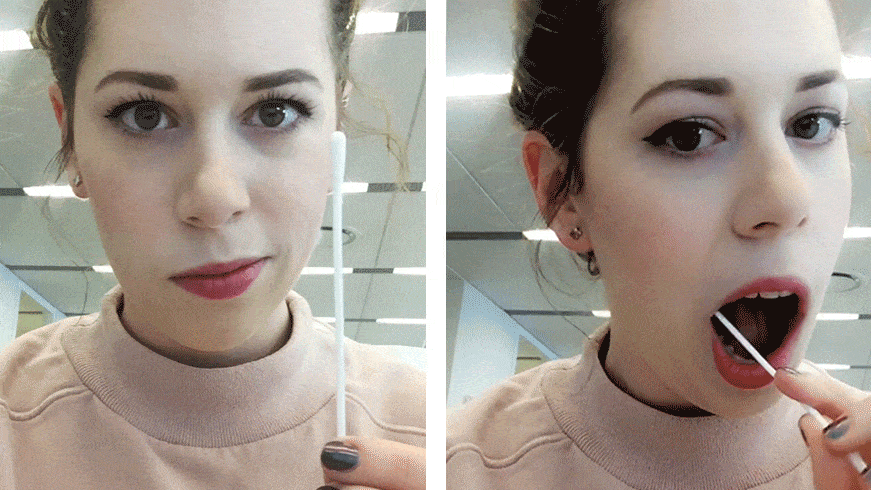

In case you haven’t notice (JK you most definitely have), society has jumped pretty hardcore on the anti-aging bandwagon. And hey, I get it—most humans are inherently terrified of both change and mortality, so seeing your face dissolve into a bunch of lines, regardless of how beautiful and natural they are, can be a somewhat jarring experience, leaving much of the world searching for a magical, miracle “fix,” like plastic surgery, fillers, injectables, and now…DNA hacking.
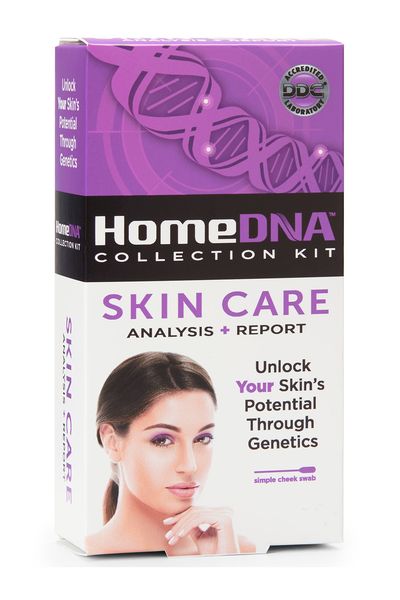
Or, at least, DNA examining, thanks to a kit called DNA Diagnostics Center HomeDNA Skin Care Testing Kit BUY IT, which, according to its press release, “examines 28 genetic markers in seven categories associated with skin aging, from collagen quality to pigmentation and skin sensitivity, and, based on results and recommended ingredients, helps customers discover the most effective products and treatments to help promote healthier, younger-looking skin.” So, for example, if your results tell you that your body sucks at breaking down UV rays, making you extra susceptible to sun damage, then hey, make sure you’re definitely wearing sunscreen on a daily basis.
The kit, which costs $25 at CVS or online (not including a lab fee of $79 that you pay online later) comes with a prepaid envelope, two long cheek swabs, and a bunch of instructions, though the process is ridiculously simple: Just register the kit online, pay the lab fee, swab the insides of your cheeks for a minute, then mail the swabs in. Then, within six weeks, you’ll get emailed your report (though, for me, it took a mere 10 days, which was sweet).
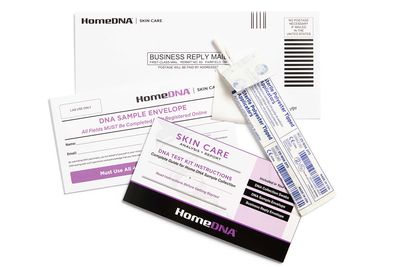
I honestly kind of expected my test to say, “LOL. U R WHITE WITH DRY SKIN. UR SCREWED,” because, as studies have shown, Caucasian skin, especially dry Caucasian skin, wrinkles and ages faster than other ethnicities’. But instead, I got an insanely detailed report, showing how I rate on a scale of non-ideal to optimal, along with a global average, for each of the seven categories tested, which includes fine lines and wrinkles, sun protection, skin sensitivity, skin elasticity, pigmentation, collagen quality, and skin antioxidants. And, surprisingly, most of the results seemed pretty accurate, like my report on my skin sensitivities.
If you know me, you know that my skin is as temperamental as a sweaty baby deprived of naptime sitting next to a Fabergé egg. So seeing that I scored “non-ideal” for three of the five genetic markers for skin sensitivity—pretty far below the global average—was weirdly validating and surprising. But how could my DNA know that I’m an itchy, flushed human being? As it turns out, it’s actually not that surprising. At least, to a doctor.
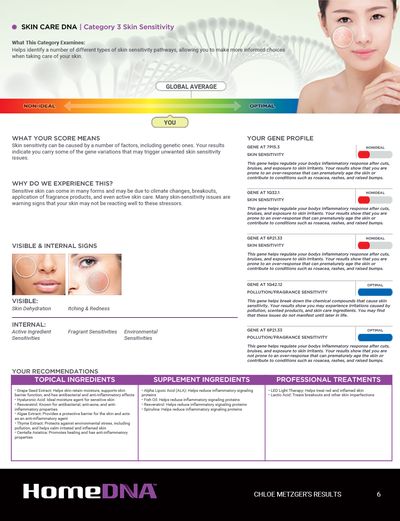
“There are some genetic markers for predispositions, but most of these results are probably generalized based on your genetic background,” says Annie Chiu, MD, dermatologist at The Derm Institute. So, you know, my long ancestry of redheaded Germans with classically sensitive, easily irritated skin. But even more important than your DNA, says Chiu? Your lifestyle.
“While information found in your genes can definitely predetermine who might age more quickly, the environment plays a much greater role in this,” she says, adding that “a DNA test of redhead twins of Irish decent would suggest they are sensitive to the sun and will probably age prematurely, but what if one of these twins lives in Holland, and the other lives in Brazil? What if one smokes and the other doesn’t? Or one goes to tanning salons? Their skin will have very different needs, and one will most definitely age more quickly, all of which is information that’s not available in a DNA test.”
Get exclusive access to fashion and beauty trends, hot-off-the-press celebrity news, and more.
Okay, okay, but what about the other skin categories, the other claims on the packaging? Because, as I would like to brag, I scored SLIGHTLY above the global average for pigmentation (and, uh, slightly below for skin elasticity, but whatever). “In general, we already know what skin problems we are prone to have, and we don't need DNA tests—we can just look in the mirror, or at our parents,” says Dr. Chiu. “We also know the mechanics of skin aging are the same for everyone, so common anti-aging treatments don’t need to change based on genetics, since they work for everyone.”
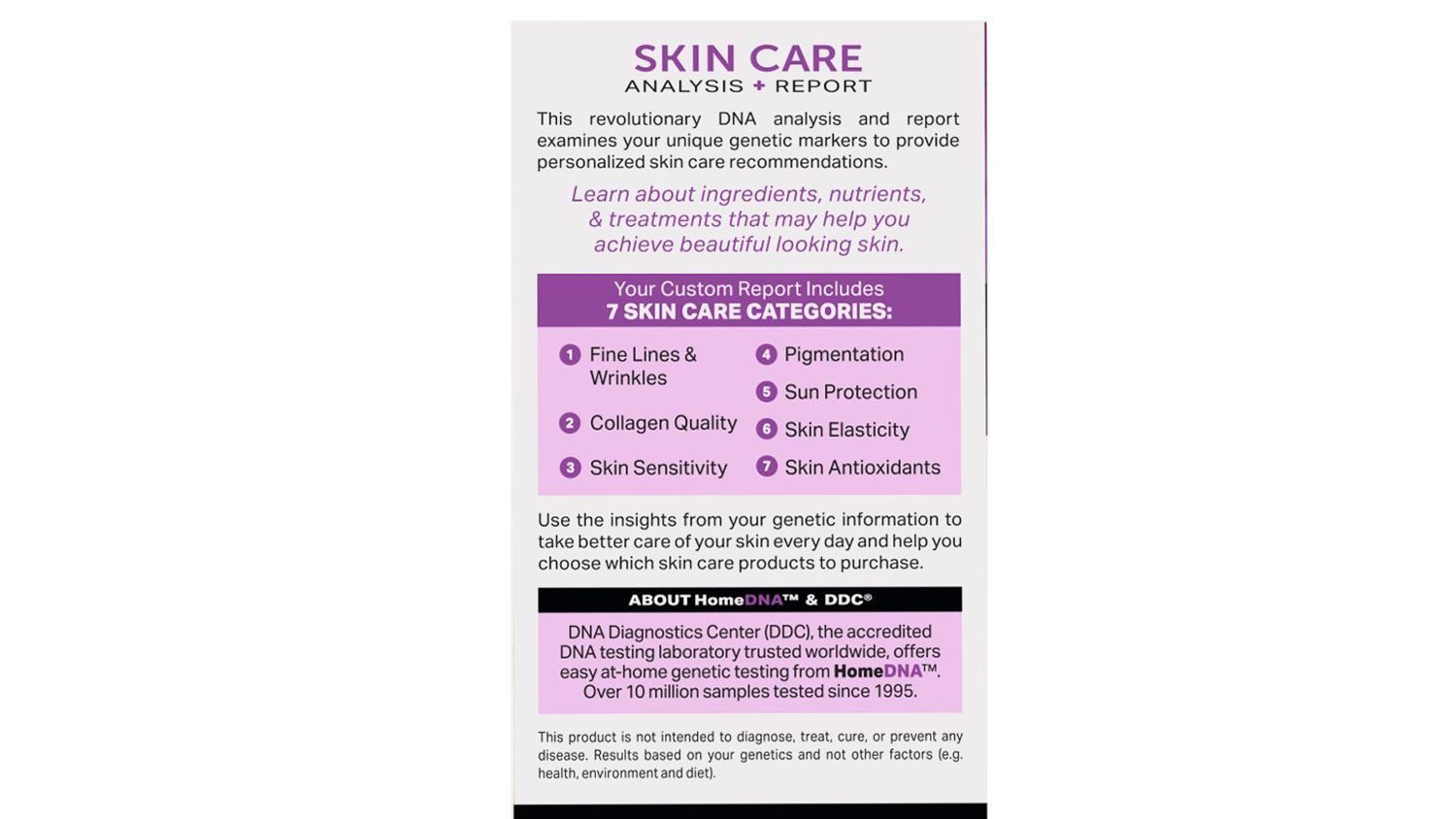
And, sure, to be fair, the test pretty much lists every single skin recommendation you could possibly use. For each category, the test suggests topical ingredients, supplement ingredients, and professional treatments, and although, yes, there does seem to be some customization (as in, not every single ingredient under the sun is listed), it’s also nothing you wouldn’t already find in most generic products, like zinc oxide and ferulic acid in sunscreen and anti-aging products.
Still, even though I wasn’t blown away by the test, and I can’t totally justify the cost, I would definitely suggest trying it out, if you find a spare $99 on the street, especially if you’re a total skincare newb who truly doesn’t know what to focus on. Because looking at this test, I have a pretty good indication that I need to—or at least could try to—bulk up my fight against skin sensitivity and elasticity by adding more vitamin E, green tea extracts, hyaluronic acid, and about 10 other things to my current lineup. But as for Dr. Chiu, she’s still not sold: “In my opinion, there just isn’t enough information from scientific studies yet to justify the money spent.”


Chloe Metzger is the deputy beauty director at Cosmopolitan, overseeing the editorial content and growth strategy of the hair, makeup, and skin space on digital, while also obsessively writing about the best hair products for every hair type (curly girl here; whattup), and the skincare routines that really, truly work (follow her on Instagram to see behind-the-scenes pics of that magazine life). She brings nearly a decade of writing and editing expertise, and her work has appeared in Allure, Health, Fitness, Marie Claire, StyleCaster, and Parents. She also has an unhealthy adoration for Tom Hanks and would like to please meet him one day, if you could arrange that. Thanks.